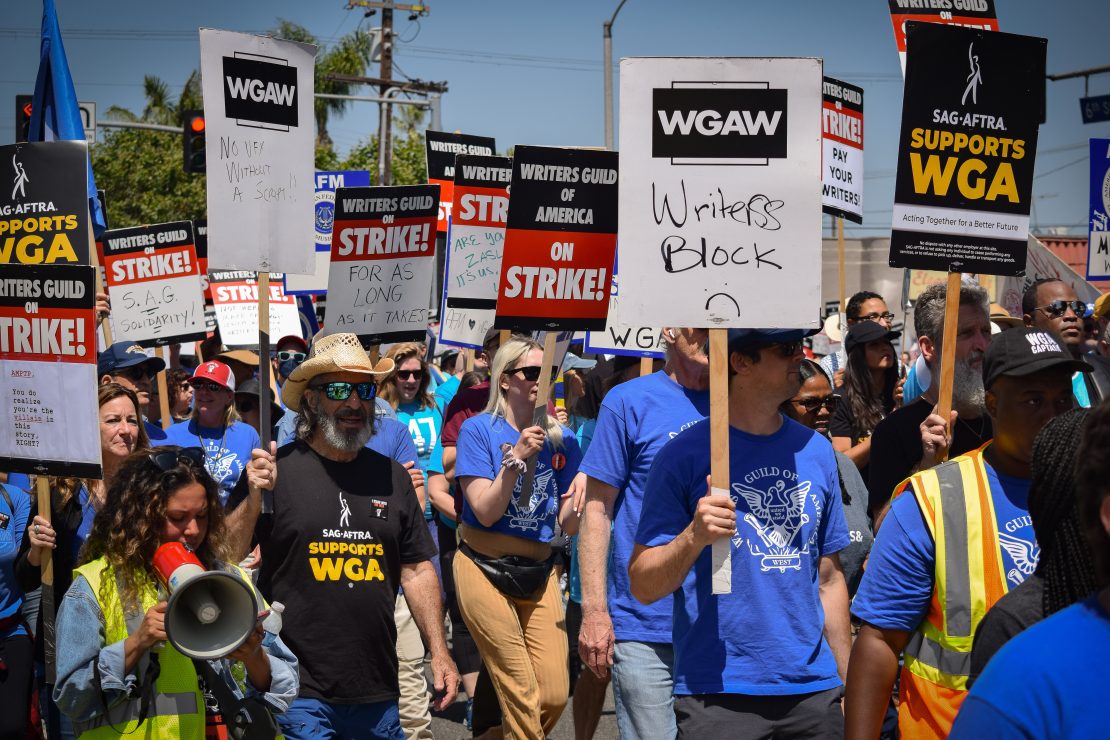An alarmist look at the writers’ strike

Ufcw770 via Unsplash.
There’s an AI moment happening. Humanity is drawing boundaries for AI’s steely fingers in our culture.
There are good-looking, A-list celebrities involved as well. How can we not pay attention? The writers’ strike stretched across 148 days, and the SAG-AFTRA actors’ strike continues at the time of writing. The outcome of both will be a watershed moment in human/AI relations.
Two major issues are at the heart of the job action, one of which is payment from streaming services, an important topic regarding intellectual property. But I’m more interested in the other issue — AI. Writers want writers to be the writers. Sounds simple, right?
Yet, what would happen if AI could flawlessly create the content these recently-striking writers produce for free, in moments, forever, without complaint? This scenario feels inevitable with how quickly generative AI capabilities are advancing. How long will writers last when that happens? A glimpse at history shows us waged jobs don’t survive under such circumstances. How long will actors last when AI can recreate someone’s image perfectly? Singers and musicians?
The line has been drawn for film and television writers, and for now, AI is explicitly excluded. According to the Writers Guild official overview, AI cannot replace writers or be taught using their work. This will influence how much cultural sway artificial intelligence has on popular culture going forward. It will still be somewhere between immense and immeasurable, I suspect. But people should know what is and isn’t AI-generated. For now, movies and television will not be. Perhaps in the future there will be stamps, like ‘organic’ stickers on supermarket groceries.
We shape our culture around the stories we tell, and our culture shapes our narrative tastes. Stories teach us to be brave, wary, how to triumph, and how to resist. We need to be careful with the extent to which we give that responsibility over to AI. We are the stories we tell, so with AI producing those stories, who are we? Perhaps a series of algorithms, computed, coded, then fed the narratives we want: a loathsome thought. Our stories are too important, especially those reaching millions, to hand over. It sounds dramatic, but this strike is the first major battle against AI for our soul. It’s not like the movies promised it would be, which is ironic. Personally, I was hoping for more soulless, laser-shooting robots.
What we have instead is students using ChatGPT and educators scrambling to respond. We have creepy deepfakes, dead actors playing roles from the digital beyond, and unemployed visual artists.
AI is moving fast. We must react just as fast. Now is the time to stand together and decide what direction AI will take. If you don’t already, talk about it with people. Learn about AI and pay attention to where it’s going because it’s already replacing folks. Whether you work in healthcare, customer service, or coding, AI might be headed your way like an electric shark.
Regardless of how you regard Hollywood, the influence of movies, TV shows, and all of the other things writers write for, this is still a moment to pay attention. This is not about our favorite shows going dark for half a year or the film and television industry’s tremendous local employment presence, though those things are important. This is about how we want to exist under AI’s influence. What has been laid out by the writers’ strike will become the starting point for future negotiations. Other industries will follow. It’s time to sit up and take notice.






